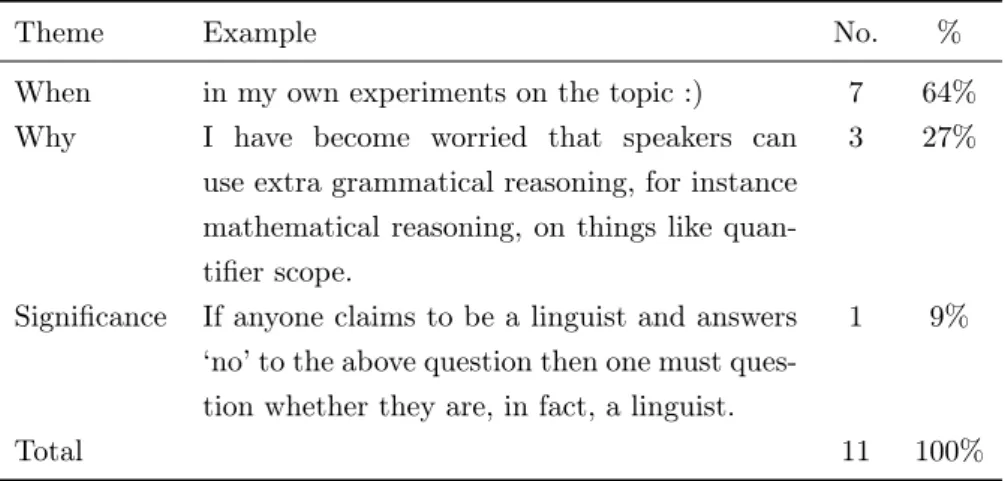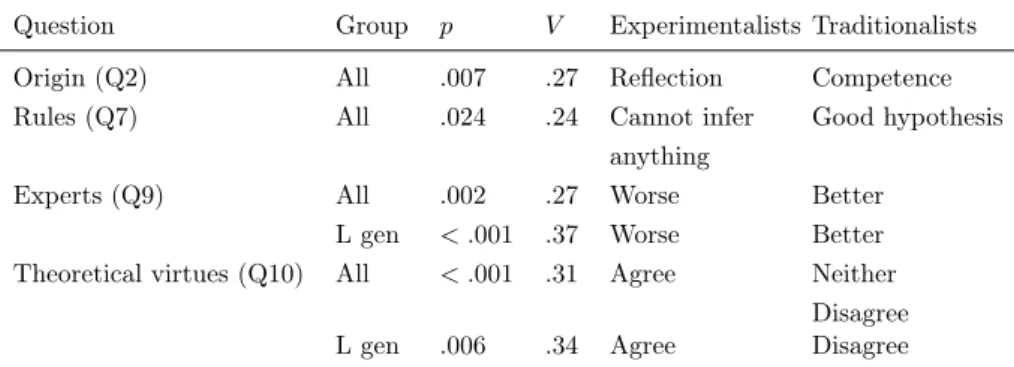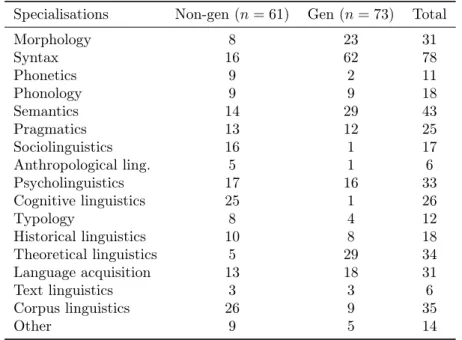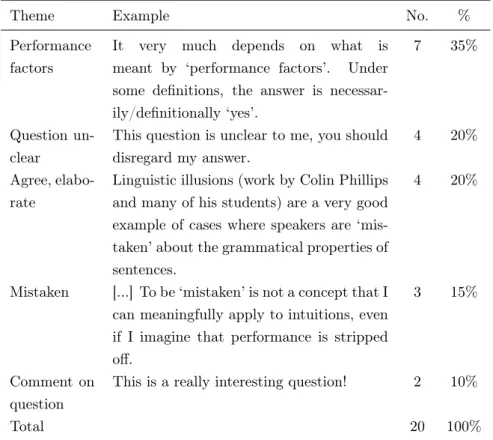This thesis also presents and defends a new account of the etiology of linguistic intuitive judgments. To address them, I focus on the theoretical assumptions underlying the practice of using linguistic intuitive judgments as evidence for grammatical theories.
Aims
The use of intuitive judgments as evidence for theories of grammar is contested between the two sides. Will the justification of the evidential use of intuitive linguistic judgments also apply to philosophical intuitive judgments?
Intuitive judgements in linguistics
Finally, this dissertation may in some way be relevant to the debate on the use of intuitive judgments as evidence in philosophy. Some philosophers have drawn parallels between the two domains' practices of using intuitive judgments as evidence (e.g., Machery and Stich 2013).
What are intuitive judgements?
This of course makes the use of intuitive judgments as evidence for some conclusions vulnerable to the risk that others do not share the intuition.3. 3In this thesis I proceed from the assumption that intuitive judgments are actually used as evidence for grammatical theories in linguistics.
Overview of the dissertation
I then present two non-generative accounts of the etiology of linguistic intuitive judgments, as well as guidelines from the non-generative literature for using intuitive judgments as evidence for grammatical theories. However, intuitive judgments are also used as evidence for grammatical theories outside of generative linguistics.
Introducing the main views
The Voice of Competence view
In my reading of Devitt's characterization of VoC, even in the non-standard version of VoC there is no central processor involvement. Devitt thinks that no plausible account of how embodied rules can be derived in the content of an intuitive judgment without the involvement of the central processor is likely to be forthcoming, and so he also rejects the non-standard version of VoC.
The Critics’ Views
However, Devitt (2013) criticizes this idea, arguing in effect that if the role of competence is only to provide data for judgment, then views such as these are basically just different versions of his own account (presented below) since “the intuitions arise from the subject's central processor reflection on the data to try to understand the string".
The Modest Explanation
But the theory-ladenness of intuitive judgments also includes the possibility that intuitive judgments are loaded with folk or expert theories. Linguistic intuitive judgments of naive speakers are theory-laden like all perceptual judgments, and part of this theory-ladenness is that the concepts they use about their linguistic world are the concepts of.
Disagreements
- Origin of intuitive judgements
- Acceptability or grammaticality
- The role of competence: supplying content or data?
- Direct access?
- Conception of linguistics
- Implemented structure rules
Second, in this view, the speaker's linguistic competence provides the informational content of the judgment without the involvement of the central processor. A proponent of the Critical View might say that intuitive judgments need not be related to, say, command c to be evidence of command c.

Summing up
He presents the view that linguistic intuitive judgments are "derived from mentally represented or tacitly known grammatical principles". Instead of the speaker's competence providing the informative content of intuitive judgments, Devitt's critics believe that competence provides the data for intuitive judgments.

Experimental Syntax
Exactly what to ask participants when intuitive judgments are elicited from them is less discussed in the XSyn literature.
Motivations behind the experimentalist movement
- Sensitivity
- Reliability and validity
- Methodological standards
- Summing up
The proponents of XSyn generally criticize the proponents of the traditional method for not living up to common scientific standards. Some of the proponents of XSyn also criticize the traditional method for not being rigorous enough.
Traditionalist reactions
- Sensitivity
- Reliability and validity
- Methodological standards
- Idiolects
Some proponents of the traditional method counter by arguing that experimental methods better capture the graded nature of grammar through graded intuitive linguistic judgments. How experimentalists respond to this. 2013) begins the discussion with Sprouse and Almeida (2013a) about the reliability of the traditional method.
Experimental Syntax and the etiology debate
The traditionalists' preference for using the intuitive judgments of linguists over those of lay subjects, in fact, seems to point in the opposite direction. As for the modest explanation, we must use the intuitive judgment of those with the most expertise and the best theories.
Intuitive judgements in non-generative frameworks
Etiology accounts
However, this means that intuitive judgments should not be regarded as direct reports of the speaker's (stationary) native language competence. According to both views, linguistic intuitive judgments are based on theories of language held by speakers.
Methodology
Processing will, otherwise equal, be effortless in those cases where the sentence is part of the speaker's language, and the speaker will evaluate those sentences positively. In the cases where the sentence is not part of the speaker's language, the processing will fail, and this will cause the speaker to evaluate the sentence negatively.
Summing up
A majority of non-generative linguists hold the Voice of Competence view or any of the other views presented in the debate. Is there a difference in how linguists with different specializations within linguistics view the issues of the etiology debate and the Experimental Syntax debate.
Overall structure of study
Are there any differences between generativists and other linguists when it comes to their views on the etiology of intuitive linguistic judgments and the experimental syntax debate. Is there a difference between experimentalists and traditionalists (see chapter 3) when it comes to their views on the etiology debate.
Questionnaire design
- Defining and operationalising concepts
- Formative indexes
- Phrasing items
- Ordering items
- Item type, format, and answer categories
- Instructions
- Pilot test
As we shall see in Chapter 6, there are still some questions about phrasing left in the final version of the questionnaire. Here is an example: A question concerns the role of the speaker's mental grammar in the etiology of linguistic intuitive judgments.
Materials
This is probably the actual process of how syntactic intuitions are formed in the mind. Can you think of a situation, before answering this survey, where you thought about whether syntactic intuitions could serve as evidence for theories of grammar.
Participants
Participants also had the option to specify whether they had used intuitive language judgments gathered in any other way. Participants who chose this option mentioned using intuitive linguistic judgments they received from others.

Potential weaknesses of the design
Example analysis
In a quantitative approach, according to Morgan, the goal of analysis is often to present the patterns present in the data. Qualitative content analysis seems particularly appropriate for analyzing the comments in this study.

The etiology debate
All these comments pointed to a certain lack of clarity in the wording of the question. This result does not support any of the three views discussed, which are the majority views among generative linguists.

Experimental Syntax
An overview of the content analysis for all optional comments for this question is given in Table 6.20. An overview of the content analysis for the optional comments to question 10 is given in Table 6.22.

Other questions and comments
An overview of the content analysis for the optional comments for question 14 is given in Table 6.31. An overview of the content analysis for the optional comments for question 15 is given in Table 6.33.

The non-generative majority view
The etiology debate
In the modest explanation, the processing rules of the mind must obey the structure rules we obey (thes if option), and while the result does not show that this option is significantly more frequent than all other options, it is significantly more frequent than the good hypothesis option, which is clearly the most interesting contender (as it is also significantly more frequent than the other option). Nor is it part of the non-generative majority view that intuitive judgments are derived from the rules of speakers' mental grammar.

Experimental Syntax
The distribution of the quantitative results and the optional comments given by participants show that opinions on this issue are divided within the non-generative group of participants. In the non-generative group, the answer actual grades were significantly more frequent than the other two options.

Other questions and comments
In summary, a significant majority of non-generative participants agree that, in general, formal methods should be used to collect and analyze intuitive linguistic judgments. Finally, it was a significant majority of non-generative participants who agreed that, in general, formal methods should be used to collect and analyze intuitive judgments.

Association analysis
Example analysis
From this analysis, we see that, within the group of all participants, syntacticians were more likely than non-syntacticians to think that linguistic intuitive judgments can stand alone as evidence. From Table 6.64 and the standardized residuals, we see that those who agree more with traditionalists (positive scores) are more likely to think that linguistic intuitive judgments can stand alone as evidence than those who do not.

Theoretical orientation
Generativists, on the other hand, were more likely than non-generativists to answer that intuitive language judgments can in fact be derived from mental grammar (neither of these positions are the majority positions in the respective groups). Generativists, on the other hand, were more likely than non-generativists to disagree with the statement that intuitive linguistic judgments can be mistaken.

Specialisations
Syntaxists were more likely than non-syntaxists to think that we should be interested in the linguistic capacity of the mind. Theoretical linguists were more likely than non-theoretical linguists to agree that traditional methods provide good evidence.

Methodology: experimental or traditional
The experimenters replied earlier that we cannot deduce anything about how language is processed by looking at structure rules. In both groups, the experimentalists agreed rather than the traditionalists that having reliable data is more important than theoretical virtues.

Summing up
On the other hand, traditionalists were more likely than experimentalists to think that intuitive judgments serve as evidence because they express speakers' competence, and that it is a good hypothesis that the rules of structure are implemented in the speakers' minds. Within the non-generative group, semanticists were more likely than others to believe that we cannot infer anything about how the mind processes language by looking at structural rules.

The Experimental Syntax debate
The majority generative view
The majority non-generative view
There was no clear majority on whether experts' linguistic intuitive judgments provide better evidence for theories of grammar than those of ordinary speakers, or on whether informally collected intuitive judgments provide good evidence or not.
Associations
Overall, however, the majority view among non-generative participants was quite close to the experimentalist views presented in the experimental syntax debate. Also in the group of all participants, cognitive linguists were more likely than other participants to think that experimental methods should be used when collecting and analyzing intuitive judgments.
Concluding remarks
That being said, this answers one of the main points of debate between Devitt and his critics. I then present and defend a new proposal that explains the evidential role of linguistic intuitive judgments and incorporates important insights from both sides of the debate.
The current debate
In this chapter I will focus on Rey's (2013; forthcoming) account, one of the prominent and more fully developed accounts in the debate. On this view, the competence does not provide the full informative content of the intuitive judgment (problem 1), but the competence provides special input to the central processor (problem 2) in the form of structural descriptions.
The proposed account
Preliminaries
The datum
The judgement
Objections
Just the Modest Explanation?
Acceptability or grammaticality
A version of VoC?
Special input: Rey’s evidence
Other judgements
Expertise
Conclusion
My justification account
Implications
Perspectives
Summing up




